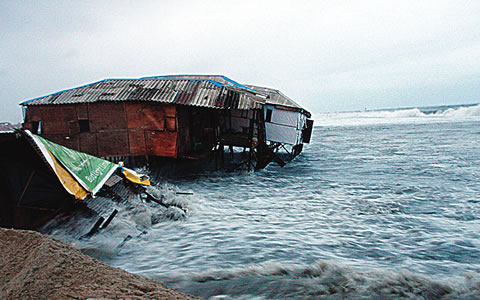FG need to release adequate funds to tame vanishing coastlines in Nigeria

By Femi Akinola
The coastal environments worldwide have become important because they account for a substantial proportion of human civilisation and wealth.
Coastlines connect sea and land, home to diverse flora and fauna, and contribute to the earth’s ecological balance.
In addition, coasts have high tourist value and protect coastal infrastructure. Primarily, a product of tidal and sea waves, together with the spatio-temporal scale at which these forces operate, causes changes in shorelines.
These forces are known to be caused by natural factors such as climate change, tidal movements, sedimentation rates, beach erodibility, subsidence, and coastal terrain.
Researchers noted that these environmental factors are often triggered by anthropogenic factors, including population growth, deforestation, tourism, urban development, coastal sand excavation, and other upstream activities, such as the construction of large dams that reduce riverine sediment supply.
Many studies carried out by researchers have predicted a notable increase in sea level over the coming decades, which will trigger coastal erosion and cause monumental damage to coastal ecosystems and human civilisations that concentrate on ecological zones.
Furthermore, increased population pressure coupled with the sustained quest for economic development has heightened coastal vulnerabilities in numerous regions of the developing world.
For example, Ayetoro, a town in the riverine area of Ondo State, was once like a paradise, a city where every resident lived joyfully and happily, and a visitor would really enjoy living there. But today, the old community is submerged beneath the waves. More than two-thirds of the town has been claimed by sea erosion.
The community is now slipping away, having lost more than 10 square kilometres, or nearly 60% of its land, to the ocean in the past three decades.
The remnants of sunken buildings in the town bore the scars of the relentless advance of the sea, which chips away at the shores of the Ondo State community. Thousands of people have left, though many others choose to remain.
Researchers say several factors are contributing to Ayetoro’s disappearance. Olusegun Dada, a geologist and professor at the Federal University of Technology, Akure, listed underwater oil drilling as one of the key reasons for coastal erosion at Ayetoro.
Dada and other colleagues note other reasons, including the deforestation of mangroves, which help anchor the earth, and the erosion caused by ocean waves.
” I discovered the changes happening in the environment (Ayetoro), and there is a need to understand the marine processes that are occurring; as we can see in this environment, we have the ocean surge and erosion. And at the same time, we have flooding from time to time,” the geologist noted.
In the context of Lagos coastlines, anecdotal and observational evidence suggests that unauthorised sand mining by artisanal miners and prominent construction to feed small—and large-scale construction works are widespread within the island axis in Lagos, Nigeria, contributing to severe coastal erosion in the state.
What was observed regarding vanishing coastlines in Nigeria is that dramatic images of coastal communities slipping away only capture the government’s attention from time to time, particularly when annual flooding occurs—another effect of climate change.
In Nigeria, we talk about climate change, global warming, and sea level rise on a daily basis, but the authorities aren’t really keen on investing the required funds to tackle the causes of the vanishing coastline at Ayetoro, Lagos, and other coastline communities that are vulnerable to shoreline erosion.
